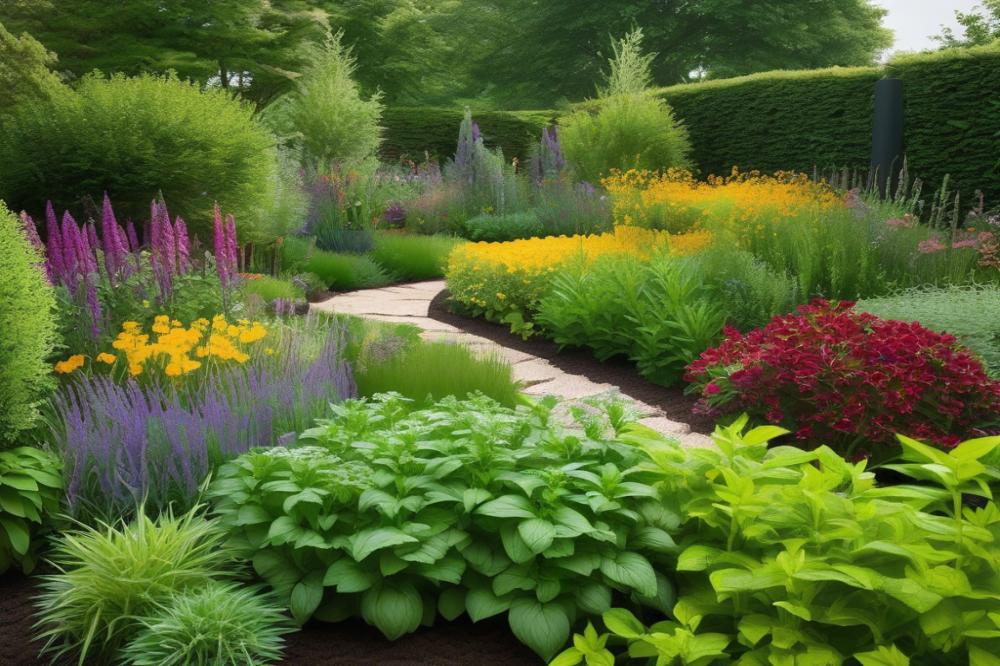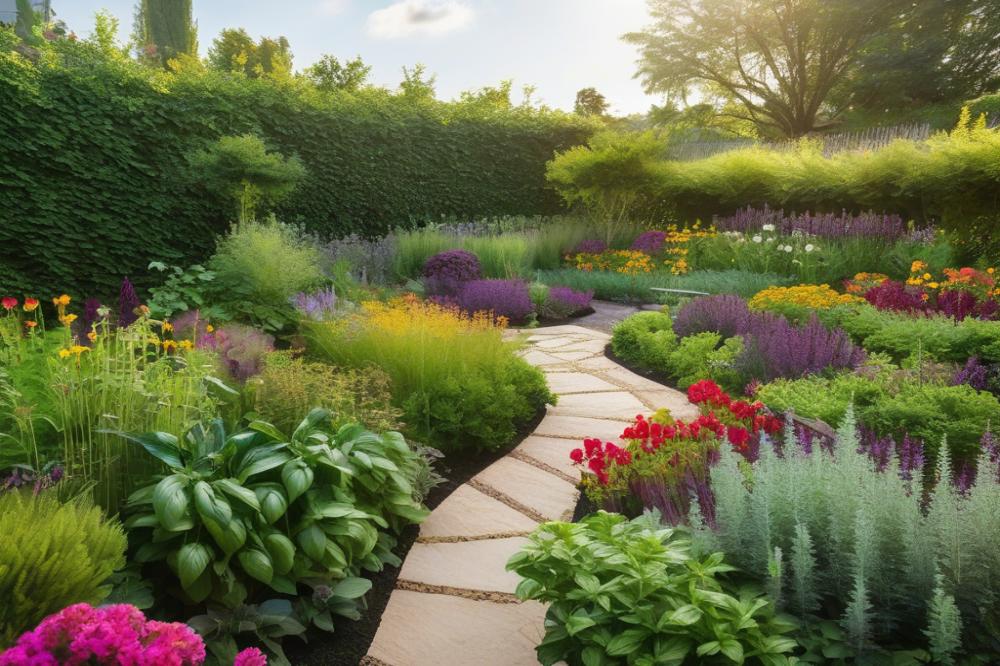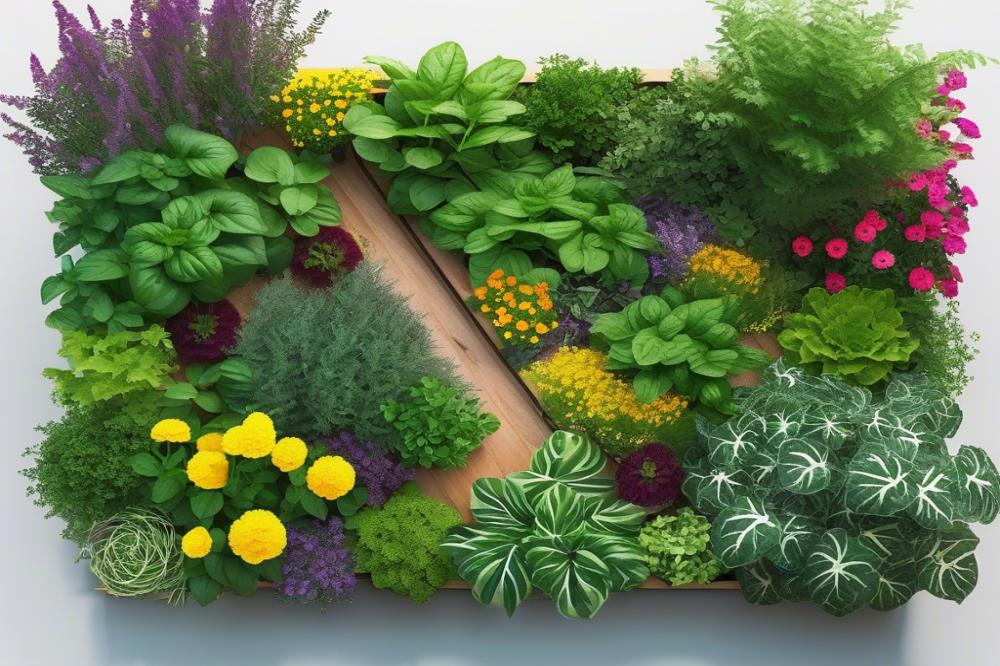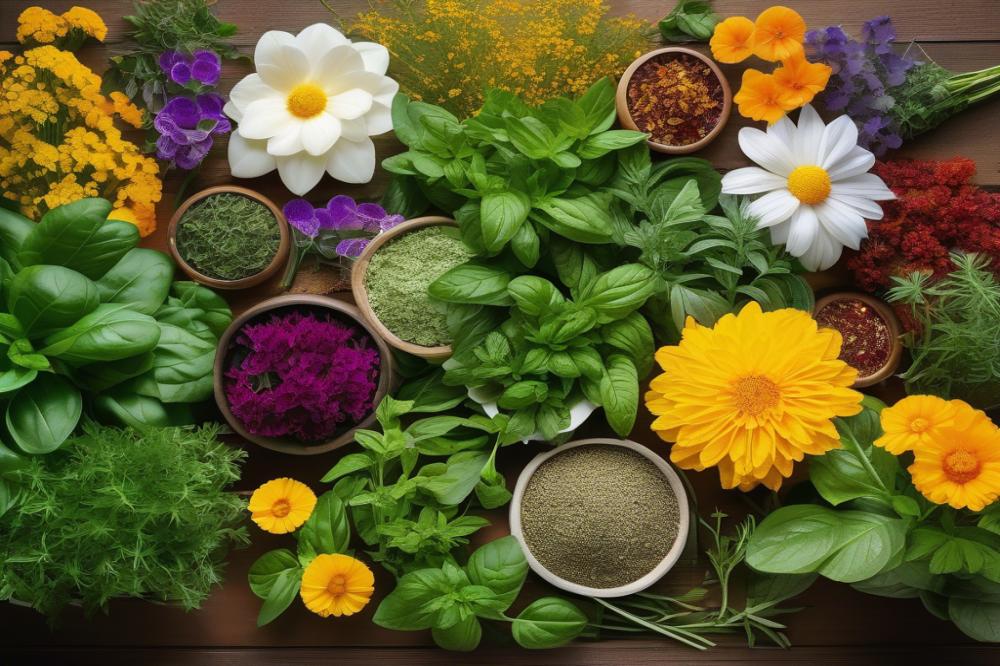herbs-in-cold-climates-tips-for-success”>companion planting with herbs: Boosting Your Garden’s Health
gardening has long been a cherished practice, blending art and science with nature. One effective method to enhance a garden’s potential is through the art of companion planting. This approach involves placing different plants in proximity for mutual benefits. Instead of growing vegetables or flowers alone, mixing various species can yield remarkable results.
Herbs play a significant role in this practice. They can boost plant health, support pest control efforts, and even attract beneficial insects. When you grow herbs alongside your vegetables, they can deter harmful pests while luring in pollinators that increase the crop yield. This method enriches the garden biodiversity and creates a more resilient ecosystem.
Incorporating these plants does more than just provide flavor to dishes; it’s about nurturing the entire garden. Certain herbs enhance the soil, which leads to better growth for neighboring crops. Basil, for example, not only adds taste to meals but also helps tomato plants flourish.
Organic gardening thrives on techniques that promote natural balance. Companion planting complements this philosophy well. It provides a way to use nature to create habitats for helpful creatures, all while minimizing dependency on chemical pesticides. Additionally, many herbs serve as natural remedies, offering health benefits to those who tend to their gardens.
By exploring the benefits and methods of companion planting with herbs, gardeners can unlock the secrets to a successful and vibrant garden. This practice helps cultivate a healthier growing environment, making it an essential concept for anyone passionate about gardening.
Understanding Companion Planting


Companion planting is a gardening technique that involves growing different plants together for mutual benefits. This method encourages a healthy ecosystem within the garden. Each plant plays a role, much like a team working toward a common goal. The principles behind this practice revolve around plant relationships that enhance health, growth, and productivity.
Organic gardening greatly embraces the concepts of companion planting. It relies on natural methods rather than synthetic chemicals. Beneficial plants can act as natural pest repellents. For example, marigolds can deter harmful insects, helping keep your herb and vegetable crops safe. This approach not only protects plants but also boosts overall garden biodiversity.
Understanding how plants can support each other is essential. Certain herbs, when grown alongside vegetables, can enrich the soil. They contribute nutrients that enhance growth and health. For instance, legumes fix nitrogen in the soil, which is essential for other plant types. As crops grow stronger, the overall crop yield can significantly improve.
The relationship between plants isn’t just about protection. Many plants offer natural remedies to combat pests and diseases. Basil can improve the health of tomatoes when planted nearby, making both more resilient. This cooperative interaction leads to a thriving garden, where each herb and vegetable plays a part in maintaining plant health.
Exploring these interactions reveals the importance of diversity in gardening. Each herb or vegetable adds to the garden’s ability to resist pests and reduce disease. A diverse garden is less likely to suffer from infestations and other issues. Implementing these planting strategies results in not just higher yields but also healthier plants overall.
By understanding the significance of these relationships, gardeners can make informed choices. Knowledge about how plants work together allows for more effective planning and planting. This results in a vibrant, productive garden that thrives on natural processes and improved soil health.
Choosing the Right Herbs for Companion Planting


Herbs can be powerful allies in your gardening efforts. Selecting the right herbs enhances plant health and boosts your garden’s overall vitality. Different herbs possess unique properties, making them ideal companions for various crops.
Basil is a favorite among gardeners. This aromatic herb is known for its ability to repel pests like aphids and whiteflies. Planted alongside tomatoes, basil can improve their flavor and resistance to insects. Incorporating it into your garden not only affects pest control but also elevates the culinary appeal of your harvest.
Marigolds are another exceptional choice. These vibrant flowers attract beneficial insects while deterring harmful ones like nematodes. Their roots contain compounds that enrich the soil while warding off pests, making them great companions for nearly any vegetable. Planting them at the edges or interspersed through your garden can create a robust environment.
Mint is often considered a powerhouse for pest control. It emits a strong scent that drives away ants, aphids, and even beetles. However, it’s essential to plant mint in containers. This method prevents it from overtaking your garden due to its vigorous growth. Used wisely, it can enhance both biodiversity and pest management in your garden space.
When deciding which herbs to grow, think about your garden’s specific needs. Consider the plants already thriving in your garden. Some herbs, like dill, can attract beneficial insects such as ladybugs, enhancing your crop yield. Look for herbs that complement each other and address your specific pest concerns.
Maximizing your garden’s potential involves utilizing space wisely. Interplanting herbs with vegetables can prevent competition for nutrients while enriching the soil. Organic gardening principles advocate for maintaining balance among plants. This method improves all aspects of garden health.
In summary, the right selection of herbs can lead to a thriving garden. They can serve multiple purposes, from pest control to enhancing flavors in your harvest. By understanding the role of each herb, you can cultivate a diverse and fruitful garden ecosystem.
Benefits of Companion Planting with Herbs


Using herbs in the garden offers numerous advantages for plant health. One of the primary benefits lies in enhanced pest control. Certain herbs naturally repel harmful insects, reducing the need for chemical interventions. For instance, plants like basil deter flies and mosquitoes, while lavender can keep away unwanted fleas and moths. These natural pest management strategies support healthier growth in surrounding vegetables and flowers.
Soil fertility is another crucial aspect enriched through herb planting. Herbs often have deep roots that break up compacted soil. This action improves drainage and aeration. Additionally, as herbs grow, they release nutrients back into the soil. This natural process supports a thriving ecosystem, fostering garden biodiversity and boosting overall plant health.
Encouraging beneficial insects also helps create a more balanced environment. Beneficial plants attract pollinators like bees and butterflies. These creatures play an essential role in pollination, ultimately leading to an increased crop yield. For example, planting dill or fennel attracts ladybugs, which naturally control aphid populations.
Real-life examples support these benefits vividly. In community gardens, many growers have reported significant success by interplanting herbs with their vegetables. One gardener found that adding thyme and rosemary alongside tomatoes drastically reduced disease-related problems. Their plants thrived, yielding more produce compared to previous years without herbs. Such experiences illustrate how powerful herbs can be in a garden setting.
Furthermore, herbs can serve as natural remedies that enhance the overall quality of produce. Many cooking herbs possess unique medicinal properties, promoting health when used in meals. This quality aligns perfectly with the principles of organic gardening and sustainable practices. Thus, growing herbs not only enriches the soil but also adds value to the food produced.
Overall, incorporating herbs into your garden enhances many critical factors. From pest control strategies to increasing crop yield, the benefits are clear. Embracing this approach creates a vibrant and productive environment, establishing a strong foundation for gardeners eager to cultivate their skills.
Techniques for Effective Companion Planting


Companion planting with herbs requires careful planning and attention to detail. Begin by considering the spacing between your plants. Proper distances allow each plant to receive adequate sunlight, water, and nutrients. Overcrowding can lead to competition and reduced plant health. A good rule of thumb is to space herbs like basil and parsley about 12 inches apart from larger plants like tomatoes, which provide beneficial shade.
Scheduling is another important technique. Planting herbs at the right time can enhance crop yield. For instance, sowing basil alongside tomatoes during the warm months can improve flavors and provide effective pest control. Herbs such as chives can be planted early in the season, giving them a head start before other plants take off.
Co-cultivation strategies also play a crucial role in your gardening efforts. Certain herbs naturally repel pests. For example, planting dill next to cabbage can deter harmful insects while promoting growth. Pairing rosemary with beans can enhance soil enrichment, as legumes add nitrogen back into the soil.
Monitoring plant health is essential for success. Regularly checking for signs of nutrient deficiencies or pest infestations aids in adjusting your planting approaches. If one herb is struggling, consider relocating it to a sunnier spot or providing additional water. Each variation in growth patterns can guide your future choices.
Creating a diverse garden will boost overall biodiversity. Incorporating various beneficial plants will not only combat pests but also attract pollinators. When you plant herbs such as mint or oregano, they help create a favorable environment for beneficial insects like ladybugs and bees.
Organic gardening encourages the use of natural remedies. Many herbs possess medicinal properties that can serve as homemade pesticides. A simple mixture of water and crushed garlic can ward off a wide range of insects. Using coffee grounds around certain herbs can help deter snails and slugs.
Maintaining Health and Biodiversity in the Herb Garden
Creating a vibrant herb garden requires continuous maintenance practices. A lack of attention can lead to poor growth and limited biodiversity. Regularly rotating crops plays an essential role in maintaining soil health. Different plants have varying nutrient needs that can deplete soil if grown in the same spot year after year. By rotating, you give the soil the opportunity to naturally replenish its nutrients, leading to healthier plants.
Soil health management is crucial too. Healthy soil is filled with nutrients that support robust growth. Adding compost enriches the soil and encourages beneficial microorganisms. These tiny allies further improve plant health. Testing soil occasionally can reveal nutrient deficiencies. This allows gardeners to adjust their practices accordingly.
Organic gardening promotes sustainability and can help manage pests effectively. Many gardeners steer clear of chemical pesticides. Instead, they explore natural remedies. Introducing beneficial plants such as marigolds and nasturtiums can deter harmful insects. These flowers attract pollinators and predatory insects that can help keep pests in check.
Maintaining garden biodiversity not only strengthens the ecosystem but also increases crop yield. A diverse garden supports a range of wildlife, which contributes to the overall health of plants. With various herbs, you attract different beneficial insects and birds, creating a balanced environment. This balance helps in reducing the need for artificial interventions.
Regularly observing your plants can guide you in making necessary changes. Be on the lookout for signs of stress or pest problems. Addressing these issues promptly prevents larger problems down the road. Integrated pest management techniques can also serve as proactive measures to maintain plant health.
Incorporating these ongoing maintenance practices will establish a thriving herb garden. The effort put into crop rotation, soil enrichment, and organic pest control creates a healthier space for your plants. Over time, it becomes an eco-friendly haven that not only benefits your herbs but also fosters biodiversity in your garden.
Final Thoughts
Throughout this article, we explored the many advantages of incorporating herbs into your garden. Companion planting provides an effective method to enhance plant health while boosting overall garden productivity. Herbs such as basil, mint, and cilantro help repel pests, attract beneficial insects, and even provide nutrients to nearby plants through their natural properties.
Distinct advantages emerge when you strategically pair herbs with vegetables and flowers. Such combinations can create a more balanced ecosystem, leading to healthier plants. Connecting with nature in this way not only supports growth but also enriches the gardening experience by encouraging biodiversity.
Trying these techniques can lead to a more vibrant outdoor space. Observing how various plants interact can be both rewarding and educational. By experimenting with different herb pairings, you may discover unique benefits tailored to your specific garden.
As you move forward, consider implementing these strategies. The rewards of nurturing your garden with herbs are plentiful. You will find that your plants respond positively, and the overall health of your garden improves. Embrace the art of companion planting and revel in the flourishing landscape it creates.



